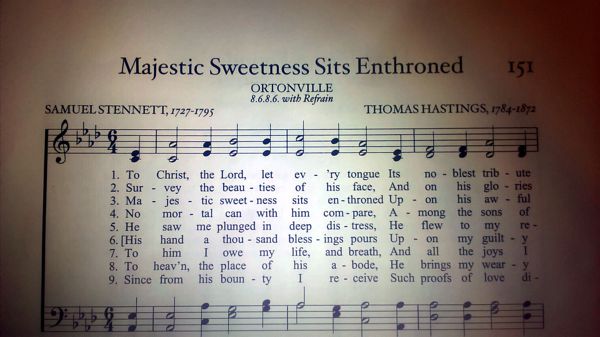Sluice Box Adventures
Believing Bible Study in the 21st century
The Moral Gravitation (Or, The Descent of Music)
King James Bible Study ... learn The Bible ... receive Help in the time of need!
1 Thessalonians 2:13 "For this cause also thank we God without ceasing, because, when ye received the word of God which ye heard of us, ye received it not as the word of men, but as it is in truth, the word of God, which effectually worketh also in you that believe."

The Moral Gravitation (Or, The Descent of Music)
Old Paths Baptist Mission © 2015 Richard St.James
10. The Top Step
Now at
the top step,
we have the God of the Bible commanding the believer in Jesus Christ to
uphold the
highest music in the songs of the whole universe.
“Speaking to yourselves in psalms and hymns and spiritual songs, singing
and making melody in your heart to the Lord;”
[Ephesians 5:19]
The King James Bible of 1611 is a self-defining BOOK. The Law of the First Mention of a word provides us the
means to
determine the
meaning of the
word.
The
means is by the context
of the passage. The context
determines the meaning of the
first instance of a word [or its variants] in the
BIBLE.
The words
“song”, “sang”,
and “sing” first show up in the book of Exodus, chapter
fifteen, verses one and two: “Then sang Moses and the children of Israel
this song unto the Lord, and spake, saying, I will sing unto the Lord,
for he hath triumphed gloriously: the horse and his rider hath he thrown
into the sea. The Lord is my
strength and song, and he is become my salvation: he is my God, and I
will prepare him an habitation; my father's God, and I will exalt him.” [Exodus 15:1-2]
The
context of this passage of Scripture where these
words are
first found is where the people of Israel [man] are
rendering
thanks and praise for their salvation to God, with
uplifted voices.
Israel uttered with musical modulations of the voice, in unison,
a poem or ballad to the
GOD of Heaven to extol His greatness.
Therefore, this was the
first recorded
song sung by man upward to God on planet Earth.
It was from man to God,
and not for man himself [mankind].
Therefore the first song was
spiritual
and not for the benefit of the self [or the
flesh].
It was the
modulation of men’s voices to the
worship of God.
· The word:
song appears
44 times in the King James Bible
· The word:
sing appears
102 times in the King James Bibl
· The word:
sing appears
11 times in the King James Bible
It will behoove us
to see the importance of these words:
sing,
sang, song.
The
“hymns”
are
songs
in
praise
of God. To
sing a
hymn
is to
sing
to God.
A
Psalm
is a
hymn,
and in the singular the word appears 156 times, while the
plural
form:
Psalms
appears nine times in the King James Bible.
Consider the
psalms!
Can ever a man or a
woman or a child aim any higher?
Then
shoot for it!
Psalm 150:5:
“Praise him upon the loud cymbals: praise him upon the high sounding
cymbals.”
Psalm 33:2:
“Praise the Lord with harp: sing
unto him with the psaltery and an instrument of ten strings.”
Psalm 92:3:
“Upon an instrument of ten strings, and upon the psaltery; upon the
harp with a solemn sound.”
Psalm 144:9:
“I will sing a new song unto thee, O God: upon a psaltery and an
instrument of ten strings will I sing praises unto thee.”
Psalm 95:2:
“Let
us come before his presence with thanksgiving, and make a joyful noise
unto him with psalms.”
Psalm 105:2:
“Sing unto him, sing psalms unto him: talk ye of all his wondrous
works.”
Psalm 105:3:
“Glory ye in his holy name: let the
heart of them rejoice that seek the Lord.”
The psalm of
thankfulness rendered to God brings praise to God.
“Then on that day
David delivered first this psalm to thank the Lord into the hand of
Asaph and his brethren.” [1 Chronicles
16:7]
God is
sick
of the
songs of
those
who say they are for praise
to God. Amos 5:23: “Take thou away from me the noise of thy songs;
for I will not hear the melody of thy viols.”
Now a
top-step
song, hymn,
or
psalm
always has as its goal to extol the greatness, the
power,
the
glory,
the
victory,
and the
majesty
of God. [1 Chronicles
29:10-13]
The words of such a
song, Majestic Sweetness Sits Enthroned [by Samuel
Stennett, 1727-1795], brings us to the
top step.
This
top-step
music
communicates a
message
with the
words
towards God, where the melody is
dominant over the
harmony
and the
rhythm.
The march rhythm is
God’s rhythm.
1.
To Christ, the
Lord, let ev’ry tongue
Its noblest tribute bring:
When he’s the subject of the song,
Who can refuse to sing!
Who can refuse to sing!
2.
Survey the beauties
of his face,
And on his glories dwell;
Think of the wonders of his grace,
And all his triumphs tell,
And all his triumphs tell.
3.
Majestic sweetness
sits enthroned
Upon his awful brow;
His head with radiant glories crowned,
His lips with grace o’erflow,
His lips with grace o’erflow.
4.
No mortal can with
him compare,
Among the sons of men:
Fairer he is than all the fair
That fill the heav’nly train,
That fill the heav’nly train.
5.
He saw me plunged
in deep distress,
He flew to my relief;
For me he bore the shameful cross,
And carried all my grief,
And carried all my grief.
6.
[His hand a
thousand blessings pours
Upon my guilty head;
His presence gilds my darkest hours,
And guards my sleeping bed,
And guards my sleeping bed.
7.
To him I owe my
life, and breath,
And all the joys I have:
He makes me triumph over death,
And saves me from the grave,
And saves me from the grave.]
8.
To heav’n, the
place of his abode,
He brings my weary feet;
Shows me the glories of my God,
And makes my joys complete,
And makes my joys complete.
9.
Since from his
bounty I receive
Such proofs of love divine,
Had I a thousand hearts to give,
Lord, they should all be thine!
Lord, they should all be thine!
I will summarize this
way:
The “lying spirit” is in
opposition
to one
who is
“born of
the Spirit”
[who sings the
song of the Spirit].
It is the
entrance
of the
“lying
spirit”
[the pied
piper, who is Satan], with his music box, whose inventions
are amalgamated into the music, that
produces the
“uncertain sound”
with all its
attendant moral gravitation by a
slow descent to
“the
pit.”
God’s word [THE
BIBLE]
reveals, that
God [and all mankind] along with all the
musical
instruments, have voices that have
signification for the purpose
of an
expected
communication … in
the directing of messages … one to another.
The flow of the
messages is to be … expected, and in
a
natural order.
Top-step
in-step
music communicates a
message
with the
words
towards God, where the melody is
dominant over both the
harmony
and the
rhythm.
And lastly, the
in-step [the
march] rhythm is Heaven’s rhythm.
“For God is not the author of confusion, but of peace, as in all
churches of the saints.”
[1 Corinthians 14:33] Amen!


